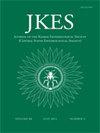A Preliminary Study on the Abundance, Seasonality, and Sampling Patterns of Amblyomma americanum (Acari: Ixodidae) in Central Missouri
IF 0.3
4区 农林科学
Q4 ENTOMOLOGY
引用次数: 0
Abstract
ABSTRACT: Amblyomma americanum (Ixodida: Ixodidae) is Missouri's most common tick species and a carrier of bacterial pathogens. The objectives of this study were to analyze tick abundance and seasonality in two locations in central Missouri, to compare the effectiveness of dragging and dry ice trap sampling methods for collecting A. americanum in the field, and to analyze tick developmental stage collection pattern. We collected ticks from Knob Noster State Park, in Johnson County, Missouri and Mark Twain National Forest, in Boone County, Missouri. On eight dates from May to November, we collected ticks simultaneously at both locations, using dry ice traps and drag sampling. Of the 7,475 collected ticks, 99.7% were A. americanum. We found the most larvae in August and September, the most nymphs in June and July, and the most adults in June. Drag sampling collected more nymphs at Columbia than Knob Noster on one sampling date in the late summer. Abundance did not differ between locations at any other time point, regardless of developmental stage or sampling method. Compared to the drag method, significantly more nymphs and adults were identified using the dry ice trap sampling method. Additionally, we found that nymphs and adults were more likely to be found in the same areas of the sampling locations, but neither larvae and adults nor nymphs and larvae followed this relationship. Our findings demonstrate a strong seasonality of A. americanum in Missouri and support dry ice trapping as an effective sampling method for collecting all of its life stages.密苏里中部美洲钝蝇(蜱螨目:伊蚊科)丰度、季节特征及取样模式的初步研究
摘要:美洲硬蜱是密苏里州最常见的蜱种,也是细菌病原体的携带者。本研究的目的是分析密苏里州中部两个地点的蜱虫丰度和季节性,比较拖曳和干冰诱捕采样方法在野外采集美洲蜱的有效性,并分析蜱虫发育阶段的采集模式。我们从密苏里州约翰逊县的Knob Noster州立公园和密苏里州布恩县的Mark Twain国家森林收集了蜱虫。在5月至11月的八个日期,我们使用干冰捕捉器和拖拽采样,在这两个地点同时采集了蜱虫。在7475只采集到的蜱虫中,99.7%是美洲蜱。我们发现,8月和9月的幼虫最多,6月和7月的若虫最多,6月份的成虫最多。在夏末的一个采样日期,拖拽采样在哥伦比亚采集的若虫数量超过了Knob Noster。在任何其他时间点,无论发育阶段或采样方法如何,不同地点的丰度都没有差异。与拖拽法相比,使用干冰诱捕器采样法识别出的若虫和成虫明显更多。此外,我们发现若虫和成虫更有可能在采样地点的同一区域发现,但幼虫和成虫以及若虫和幼虫都没有遵循这种关系。我们的研究结果表明,密苏里州的a.americanum具有强烈的季节性,并支持干冰诱捕作为收集其所有生命阶段的有效采样方法。
本文章由计算机程序翻译,如有差异,请以英文原文为准。
求助全文
约1分钟内获得全文
求助全文
来源期刊
CiteScore
1.60
自引率
0.00%
发文量
12
审稿时长
>12 weeks
期刊介绍:
The Journal of the Kansas Entomological Society is a publication of the Kansas (Central States) Entomological Society, publishes research on all aspects of the sciences of entomology, and has world-wide authorship and readership.

 求助内容:
求助内容: 应助结果提醒方式:
应助结果提醒方式:


